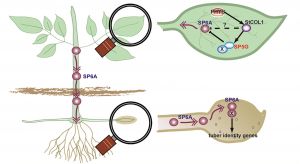The research team led by Salomé Prat at the National Center for Biotechnology of the CSIC (CNB-CSIC) has discovered why winter is the season when potatoes grow best. The study was published this month in the journal Current Biology.
Many plant developmental processes such as flowering or new shoot formation are regulated by the hours of light the plant receives during the day. Days are shorter in winter than in summer, and plants use this information to regulate their life cycle according to the seasons. Wild potato varieties that originate in the Andes, such as the Andigena variety, develop their tubers during winter when days are short.
Day length is perceived by the leaves, in which light-sensitive proteins can be activated by light. In the potato variety analyzed in this study, at the times of year when there are fewer daylight hours, a protein is produced (StSP6A) that travels through the stem to the root, carrying the message that it is time to start producing tubers.
"Several proteins are involved in this signaling process,” Prat explains. “With light, there is an increase in the levels of a protein called StCOL1 that activates an inhibitor (StSP5G) of the StSP6A gene, which is responsible for taking the message to the root that it is time to form potatoes". During the summer, when days are long, StCOL1 levels are very high, which keeps the inhibitor active. When days get shorter, however, StCOL1 decreases and StSP5G activation stops, allowing tuber formation to begin.
StSP6A, the messenger of short days
Throughout history, farmers have selected their crops, choosing seeds from the best plants for their next harvest. This has meant that, in current commercial varieties, this sensitivity to the number of daylight hours is reduced, and we have potatoes all year around. Nonetheless, day length still influences tuber formation and growth, so more potatoes are collected during the winter than during the summer.
The UN considers the potato a strategic food in the fight against hunger, due to its great nutritional value, ease of growth and the almost complete use made of it. This discovery opens the door to better growth control and could therefore be an aid to countries with food shortages. "Identifying the molecular mechanisms that control tuberization will enable development of biotechnological tools that allow us to adapt this crop to different climatic conditions," concludes the scientist.
- Abelenda et al., Potato StCONSTANS-like1 Suppresses Storage Organ Formation by Directly Activating the FT-like StSP5G Repressor, Current Biology (2016), http://dx.doi.org/10.1016/j.cub.2016.01.066






